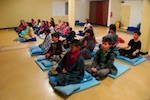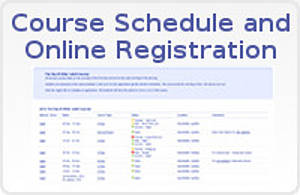On this page
Forms to register by mail
- Application Form for Children's and Teenagers' Course and Parent / Guardian Permission Form (contains 2 forms to fill)
- Medical Emergency Form and Contact List and Medical Information Form (contains 2 forms to fill)
Audio Guide for daily practice
Children and Teen Courses
More and more people throughout the world are seeking concentration, purification and peace of mind through the practice of Vipassana meditation. The ideal time to begin the first steps of this mental training is in childhood when children as young as eight years old can easily learn the technique of Anapana meditation.
Before registering to a course, please read the General Information, the Code of Conduct and the course Schedule below on this page.
For more information, visit the International Children's Website at dhamma.org
Registration
To sit or to serve a children or teen course, please register on-line on the Course Schedule Page:
After clicking on "Apply" beside the course date, you will be asked to choose between "Attend" or "Serve" the course.
All important information on the cours is also available on this on-line application form.
General information
Vipassana means "to see things as they really are" and is a logical process of mental purification through self-observation. Many come to Vipassana later in their lives, wishing they had found this technique sooner because it is so effective in learning the art of living peacefully and harmoniously.
The ideal time to begin the first steps of this mental training is in childhood when children as young as eight years old can easily learn the technique of Anapana meditation. Anapana is the first step in the practice of Vipassana meditation. It is the observation of natural, normal respiration, as it comes in and as it goes out. Anapana is a simple technique that helps develop concentration of the mind. It is easy to learn, objective and scientific. Observation of the breath is the ideal object for meditation because it is always available, and it is completely non-sectarian. Anapana is very different from techniques that are based on artificial regulation of the breath. There are no rites or rituals involved in the practice or presentation of Anapana and it is presented in a non-sectarian format. This approach is traced back to the Buddha, who rediscovered and taught this technique 2500 years ago. The Buddha never taught a sectarian religion; he taught Dhamma—the way to liberation—which is universal. Following this tradition, this technique is presented in a totally non-sectarian approach. For this reason, it has had a profound appeal to people of all backgrounds, of every religion or no religion, from every part of the world.
Besides helping them to calm and concentrate their minds, Anapana helps young people to better understand themselves and how their minds work. As they learn to calm and concentrate their minds, they gain mastery over their impulses and actions. They develop an inner strength that helps them to choose right and appropriate actions over wrong actions. This is a natural byproduct of the technique. For this reason, Anapana provides them with a tool to deal with the fears, anxieties, and pressures of childhood and adolescence. Because of its simplicity, they find the technique easy to practice and understand and they appreciate its scientific and universal nature.
Over the past 17 years, hundreds of Anapana courses have been conducted exclusively for children and teenagers around the world. These courses have yielded substantial benefits for the thousands of young people who have attended them. Many of them have experienced a positive change in their outlook, behavior and attitude. Many have found their ability to concentrate has improved and that their memory has strengthened. And above all, these young people have acquired a tool that is of immense value to them for the rest of their lives.
Children and teenagers are, by nature, active and enthusiastic, with an eagerness to learn and explore. For this reason, it is appropriate to offer them an opportunity to explore themselves and their mind with all its hidden faculties, latent abilities and subtle complexities. Learning Anapana plants a wholesome interest in self-introspection and meditation, which may open an entirely new dimension of life for them later on.
Participants are grouped by ages. The children’s course is for children ages 8 to 12 years old. The teenagers’course is for teens ages 13 to 17 years old. Courses are generally one day long. Parents or guardians who have completed a ten-day course with S.N.Goenka or his assistant teachers are welcome to apply to serve during the course, or to participate in a meditation program for old students if offered. They can register to serve or to participate in a meditation and service program for old students. They will be following a different schedule of meditation than the children and will have opportunities to do some work at the centre. Other parents and guardians who are dropping off their children are welcome to stay during the registration time but will then leave the center until the course is over.
During the course, meditation instructions are given by S.N.Goenka via audio and videocassette. In addition, there may be other activities such as art, story telling, games and journal writing. On teenagers’courses there are longer periods of meditation and of silence. On all these courses, children are assigned group leaders who support and guide them and make sure that they are comfortable and well taken care of during the course.
Parent or Guardian Information
The children’s and teenagers’ course offers young people between the ages 8 and 17 years old an introduction to Anapana meditation, which is a practice of the observation of natural breath to concentrate the mind. They will learn to practice Anapana and begin to take their first steps on the path of Dhamma. The entire path of Dhamma, rediscovered and taught by Gotama the Buddha more than 2500 years ago, is a universal remedy for universal problems and has nothing to do with any organized religion or sectarian tradition. For this reason, it can be practiced freely by all, in any place, at any time. Its practice does not conflict with any race, community or religion and will prove equally beneficial to one and all.
Young people who have started practicing Anapana have realized many benefits. Their ability to concentrate becomes enhanced, their memory gets sharper, their ability to comprehend a subject improves and they become calmer. In general, they feel they have a practical tool to use in the face of any type of adversity or challenge.
During the course, there will be meditation instructions as well as other activities such as games, art, and storytelling. The student will be divided into groups according to their age for many activities. They will be assigned group leaders who will personally accompany and assist them throughout the course, providing support and guidance as needed. The intent of the children’s and teenagers’ course is serious. It is not appropriate for children who are too young or otherwise unable to follow directions or to participate in organized, self-modulating activities. It is also not appropriate for children who are unable to understand the meaning or purpose of the daily timetable and Code of Conduct. Segregation of the genders will be maintained at all times.
With the growing number of youth attending meditation courses, it is important for adults who are serving to be adequately trained in order to answer this demand. For this reason, we must give priority to servants who can arrive Friday end-of-day to attend a training session and who can serve for the entire week-end. If, however, you are a parent or tutor who has already attended a 10-day meditation course and you have checked off the box indicating this on your child’s registration form, you may be invited to serve as needed. If you would like to have your name on the list of parents or tutors, you must fill out a request online on the same website where you registered your child for the meditation course.
All parents and tutors who are not serving the course but have already attended a 10-day meditation course are invited, if they want, to meditate from 10:30 am to 11:30 am. The parents and tutors who have not completed the 10-day course will be asked to leave the Centre after the orientation meeting, around 10:00 am and return at 4:30 pm.
Before applying for the course, please make sure that both you and your child have read and understood the Code of Conduct and Timetable.
Code of Conduct
Learning to practice Anapana meditation is very valuable because it helps you to become a better person. Practicing Anapana meditation will help you to train your mind to become concentrated and calm.This will make your mind strong so that you will be able to avoid doing or saying things that are hurtful or harmful to yourself and to others. This strength of mind will help you to feel happier and more peaceful. Practicing Anapana and learning to concentrate will help you to become the master of your mind. To help you succeed in practicing Anapana meditation it is important that you do your best to follow the instructions that you will be given during the course. While you are at the course, it is also important that you agree to follow the Code of Conduct written below. In the same way that a house needs a good foundation to support it, so the practice of Anapana needs a good foundation. This good foundation for Anapana is built by following the Code of Conduct. It will help you to avoid performing actions that are harmful or hurtful to yourself and others.
During the first meditation session at the course you will be asked to repeat the following five vows or precepts. These are written in bold and underneath each is an explanation. Please read them carefully so that you will understand what you are saying when the time comes:
| 1. | I shall abstain from killing. I promise to try to treat all beings kindly and not kill them or harm them in any way. |
| 2. | I shall abstain from stealing. I promise to take only what is given to me and not take anything which belongs to others without permission. |
| 3. | I shall abstain from a life of misconduct. I promise to treat other boys and girls as if they were my brothers or sisters or best friends. |
| 4. | I shall abstain from speaking lies, harsh words, backbiting, etc. -- which will harm others. I promise to speak truthfully, kindly and gently, and not to tell lies or to say hurtful things to anybody or about anybody. |
| 5. | I shall abstain from taking any intoxicant. I promise not to take any alcohol, drugs or intoxicants, but to keep my mind clear. |
At the bottom of your application form, when you sign your name, it means that you agree to
try and follow this Code of Conduct as best you can while at the course.
COURSE SCHEDULE
| 9:15 am | Beginning of the day - welcome | |
| 10:00 am | Orientation talk | |
| 10:30-11:00 am | Meditation | |
| Break | ||
| 11:30-12 noon | Meditation | |
| 12 noon-12:30 pm | Question period with the teacher / Break | |
| 12:30-1:30 pm | LUNCH and break | |
| 1:30-2:00 pm | Meditation | |
| Break | ||
| 2:30-3:00 pm | Meditation | |
| Break | ||
| 3:45-4:15 pm | Meditation (parents are welcome to attend) | |
| End of the course, snack and break | ||
| 4:15 pm | Parent’s arrival and departure |
Registrar
Children's and Teenagers' Course Committee
810, Côte Azélie
Notre-Dame-de-Bonsecours
Montebello (Québec)
J0V 1L0
Phone: 514-481-3504
Fax: 514-879-3437
Email: [email protected]



